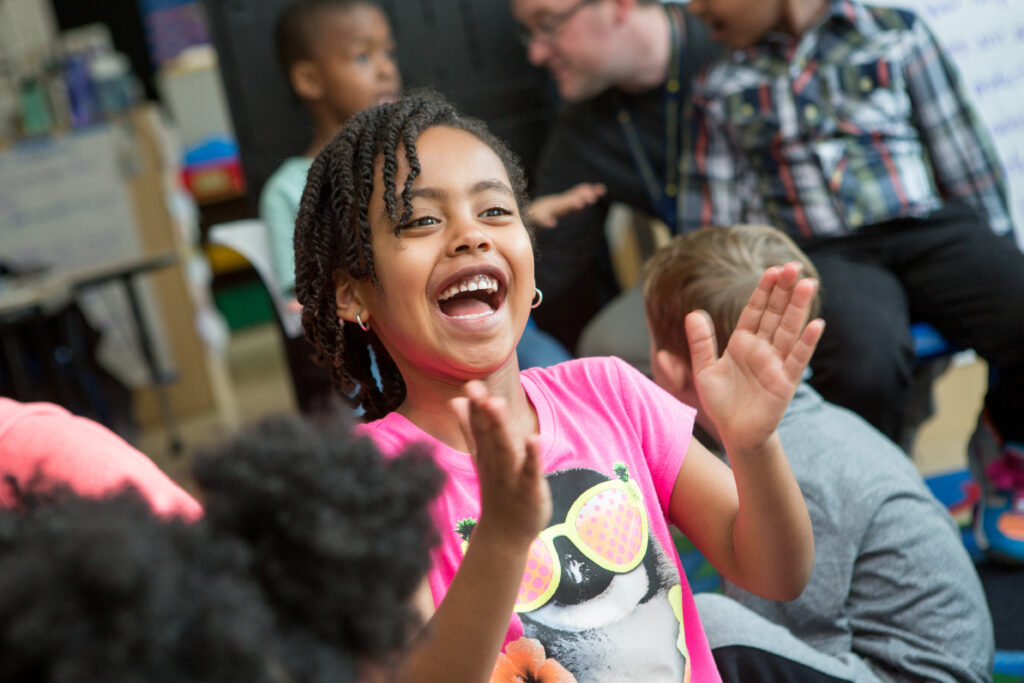Credit: Allison Shelley/The Verbatim Agency/EDUimages
The start of the school year can be anxiety-producing. We get the anxiety. Believe us, we do. Between the three of us, we parent a kindergartner, a ninth grader and a freshman in college. We know how scary it is to feel like your child is falling behind in a game with life-shaping stakes. But, as this new school year gets started, we’re trying to worry less about our own kids and put our energy into a broader, collective educational enterprise.
To understand what that collective enterprise might look like, it helps to step back and think about the goals that motivate public education. Contemporary schools serve at least three crucial social goals: helping individuals flourish, sorting students into roles in our highly differentiated economy, and creating a broader sense of solidarity.
As we settle into our fall routines, we often focus on the first two goals at the expense of the third. Because we know that education shapes our children’s life chances, we want our kids to get into the advanced math class, make the honor roll, and claim the high-status educational positions that clear the way to high-status positions in the broader world. We start to see the whole educational system as a vast tournament, where students compete for access to learning opportunities that provide access to more advanced learning opportunities that, ultimately, open the way to elite positions in the adult world.
No wonder we’re all so stressed out. We’ve turned education into a zero-sum game and invested that game with high stakes. We once talked about education as a pathway to the middle class. But today, as educational debt loads rise and machine intelligences fuel job insecurity, that pathway feels like a tightrope without a net. And that’s just part of the story. In a meritocratic culture that sees educational success as a marker of worth, we feel like our children need to excel in order to prove they matter.
It doesn’t have to be this way.
In fact, America’s new favorite social studies teacher and high school football coach shows us how different schools can be. As a long-serving public school teacher, Tim Walz recognized the way sports can bring a community together and how school leaders can channel that community toward inclusion and belonging for all students. In the classroom, he developed learning experiences that challenged students to understand the recurring sources of conflict and genocide, helping them see connections between communities across the globe. As a politician, he resisted school choice policies that allow families to wall themselves off from one another and championed a vision of schools as places where everyone — regardless of their family income — can come together around a meal.
You don’t have to be a teacher, coach or policymaker to advance this vision.
Parents, you can choose to send your child to the most diverse public school available to them; leave the packed lunch at home and encourage your child to eat in the cafeteria; praise your child for encouraging a peer who is struggling to fit in; organize parents from throughout your school’s community to get involved; and advocate for policies that provide public schools with the resources they need to ensure that all kids thrive; and vote for leaders who will make those policies a reality.
This fall, as we post back-to-school photos to social media, we’d do well to remember — and celebrate — that school is the place where we learn how to play well with others. This key lesson in social solidarity requires a curriculum far more complicated than Calculus and more nuanced than AP Literature. School teaches us to see ourselves as individuals embedded in a complex set of relationships with others. It teaches us to respect those around us, to observe them with care and empathy in order to identify, and adjust to the intricacies of any given interaction.
Taking these lessons seriously opens us — and our children — up to a deep humility and a profound sense of responsibility. When we are aware of our connections to others, we can’t help but remember that each of the people we run into has an inner life every bit as rich as our own. That we are just one of 8 billion other humans — and countless other organisms — on this planet, each of which shares the same will to survive.
This sense of solidarity is a badly needed antidote to the preening and divisive rhetoric that will dominate the news this election season. Solidarity allows us to step back and gain some perspective on our grievances, reminding us to consider our own wants in light of the wants and needs of others.
If we don’t want the divisiveness that defines our politics to define our society, we need to work together to turn away from educational competition and build schools that create solidarity.
•••
Emily K. Penner, Ph.D., is associate professor of education in the school of education at the University of California, Irvine. Her research focuses on K-12 education policy and considers the ways that districts, schools, teachers and families contribute to and ameliorate educational inequality.
Thurston Domina is associate dean for academic affairs and director of graduate studies at the University of North Carolina Chapel Hill School of Education.
Andrew Penner is a professor in the sociology department at the University of California, Irvine and director of the Center for Administrative Data Analysis.
The opinions in this commentary are those of the authors. We welcome guest commentaries with diverse points of view. If you would like to submit a commentary, please review our guidelines and contact us.

